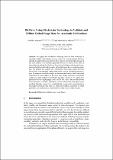Files in this item
BitView : using blockchain technology to validate and diffuse global usage data for academic publications
Item metadata
| dc.contributor.author | Lamanna, Camilla | |
| dc.contributor.author | La Manna, Manfredi M A | |
| dc.contributor.editor | Dobreva, M. | |
| dc.contributor.editor | Hinze, A. | |
| dc.contributor.editor | Žumer, M. | |
| dc.date.accessioned | 2018-11-15T13:30:05Z | |
| dc.date.available | 2018-11-15T13:30:05Z | |
| dc.date.issued | 2018-11-15 | |
| dc.identifier | 256580916 | |
| dc.identifier | 5e119770-e19e-4c47-b948-0d971e21e21e | |
| dc.identifier | 85057219402 | |
| dc.identifier | 000775537800028 | |
| dc.identifier.citation | Lamanna , C & La Manna , M M A 2018 , BitView : using blockchain technology to validate and diffuse global usage data for academic publications . in M Dobreva , A Hinze & M Žumer (eds) , Maturity and Innovation in Digital Libraries : International Conference on Asian Digital Libraries (ICADL 2018) . Lecture Notes in Computer Science , vol. 11279 , Springer Nature , pp. 267-277 , International Conference on Asian-Pacific Digital Libraries , Hamilton , New Zealand , 19/11/18 . https://doi.org/10.1007/978-3-030-04257-8_28 | en |
| dc.identifier.citation | conference | en |
| dc.identifier.isbn | 9783030042561 | |
| dc.identifier.isbn | 9783030042578 | |
| dc.identifier.issn | 0302-9743 | |
| dc.identifier.other | ORCID: /0000-0001-5542-7114/work/50743943 | |
| dc.identifier.uri | https://hdl.handle.net/10023/16477 | |
| dc.description.abstract | We suggest that blockchain technology could be used to underpin a validated, reliable, and transparent usage metric for research outputs. Previous attempts to create online usage metrics have been unsuccessful largely because it has been difficult to co-ordinate agreement between all parties on the rules of data collection and the distribution of the workload of data synthesis and dissemination. Blockchain technology can be utilized to bypass this co-ordination problem. We propose the creation of a bibliometric blockchain (called BitView) which forms a decentralized ledger of the online usage of scholarly research outputs. By means of a worked example, we demonstrate how this blockchain could ensure that all parties adhere to the same rules of data collection, and that the workload of data synthesis is distributed equitably. Moreover, we outline how public-private key cryptography could ensure that users’ data remains private while librarians, academics, publishers, and research funders retain open access to all the data they require. It is concluded that a usage metric underpinned by blockchain technology may lead to a richer and healthier ecosystem in which publishers and academics are incentivized to widen access to their research. | |
| dc.format.extent | 11 | |
| dc.format.extent | 760539 | |
| dc.language.iso | eng | |
| dc.publisher | Springer Nature | |
| dc.relation.ispartof | Maturity and Innovation in Digital Libraries | en |
| dc.relation.ispartofseries | Lecture Notes in Computer Science | en |
| dc.subject | Bibliometrics | en |
| dc.subject | Blockchain | en |
| dc.subject | Usage factor | en |
| dc.subject | QA75 Electronic computers. Computer science | en |
| dc.subject | T-NDAS | en |
| dc.subject | BDC | en |
| dc.subject | R2C | en |
| dc.subject.lcc | QA75 | en |
| dc.title | BitView : using blockchain technology to validate and diffuse global usage data for academic publications | en |
| dc.type | Conference item | en |
| dc.contributor.institution | University of St Andrews. School of Economics and Finance | en |
| dc.identifier.doi | https://doi.org/10.1007/978-3-030-04257-8_28 |
This item appears in the following Collection(s)
Items in the St Andrews Research Repository are protected by copyright, with all rights reserved, unless otherwise indicated.

